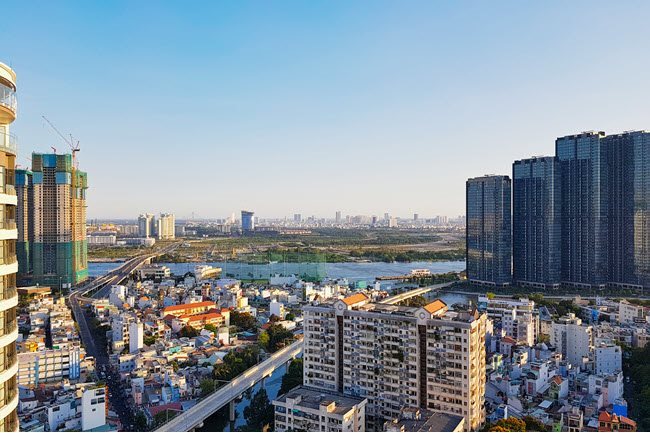 |
|
Planning and land-use fees are among the vexing problems encountered by real estate developers
|
Some have yet to obtain their site after a decade. In the context of a slump market, the HCMC authorities are trying to “rescue” these projects.
According to the HCMC Real Estate Association (HoREA), 124 frozen projects have come to life again since March 2019. However, in reality, many of them are not operating normally yet. As the market saw a sharp drop in supply, with quite a few projects reaching a deadlock due to legal issues and realty firms facing multiple hardships, the HCMC authorities on February 22 met with players in the field to work out solutions.
A lot of problems were brought up at this meeting, with planning and payment of land use fees being the most common. Le Huu Nghia, director of Le Thanh Company, expressed displeasure as he named the obstacles his firm has to face when carrying out a low-cost housing project in Tan Kien Commune, Binh Chanh District.
Le Thanh Company submitted Tan Kien—a low-cost housing project with more than 2,100 apartments—for an approval in principle nearly a year ago. However, procedures have gone nowhere due to troubles in planning. Based on the functional planning of a high-rise building, a maximum of 15 floors and a construction density of 30% are permitted. However, the land use coefficient of only 2.0 has proved to be a dilemma for the developer. With 15 floors and a building density of 30%, the coefficient of land use should be 4.5, according to Le Thanh’s calculations. Furthermore, in line with stipulations, low-cost housing projects are allowed to increase the land use coefficient by 50%. Le Thanh Company has many times petitioned related departments for permission to lift the land use coefficient. However, the problem has not been solved.
Nghia added that when Le Thanh adjusted the height of their project down to five stories in accordance with the land use coefficient of 2.0, they were rejected on grounds that the area where their project is has been planned for high-rise buildings, a decision which Nghia finds unreasonable. Relevant agencies in HCMC have discussed the problems time and again. Yet no decision has been made.
After listening to developers at the meeting, HCMC Chairman Nguyen Thanh Phong said he is aware of the dilemma confronted by estate companies. “Enterprises are struggling because they have to borrow from banks to do their projects, and yet the procedures are that lengthy,” said Phong. “The discussions on planning have lasted for nearly a year even though it should have just taken a week. There is a lack of coordination between [related] departments.”
At the meeting, a representative from Thao Dien Real Estate Joint Stock Company said its low-cost housing project Nam Ly at 91A Do Xuan Hop, Phuoc Binh Ward, District 9, has been stagnant for nearly a decade since no land has been allocated. “We have completed all the procedures required by the authorities at all levels and yet have not received a single plot of land for the last 10 years,” said the representative.
Quoc Cuong Gia Lai Joint Stock Company, another realty developer, currently has six projects in deadlock. Nguyen Thi Nhu Loan, chairwoman of Quoc Cuong Gia Lai, said their Phuoc Kien project in Nha Be District on over 91.6 hectares was already approved in principle in 2017. However, no piece of land has been allocated. The problem is the land assigned to Quoc Cuong Gia Lai was originally multipurpose, including the farmland that needs to be converted. The company must therefore contact the Department of Planning and Investment to go through all the necessary procedures from scratch again.
Due to the large scale of this project, Quoc Cuong Gia Lai has to enter into a joint venture with foreign partners. As the problem with procedures has been unresolved for three years, the company has lost trillions of dong on bank loans and interest payments to their joint venture partners. “At present, the foreign investors are displeased and want to pull out of the project,” Loan said.
Debate over land use fee payment
The payment of land use fees imposed on real estate projects is another matter of concern dicussed by company delegates and the authorities. A common complaint by enterprises was that the current procedures of setting land prices, appraising land prices and determining land use fees are way too time-consuming. If the Department of Natural Resources and Environment, the Department of Finance and other relevant agencies try to coordinate with one another, it will take about one year, otherwise at least from two to three years are needed.
Meanwhile, a commercial housing project must have an average construction time of approximately three years to be eligible for capital mobilization for the sale of homes to be formed in the future. After compensation for site clearance, approval for the detailed planning on the 1:500 scale and decision on land acquisition and allocation have all been done, if the project owner is not allowed to start construction in accordance with the Construction Law, then the costs of finances, management and project investment will surely rise, pushing up the costs and prices of the finished products, which is no good news for homebuyers.
The fact that estate enterprises must pay land use fees before they become project proprietors, before their project designs are appraised, construction permits are issued and they are allowed to start work on their projects, is not consistent with the current legal provisions nor practical, said HoREA President Le Hoang Chau.
He cited the Land Law, the Law on Real Estate Business, the Construction Law and relevant documents saying none of them obliges proprietors of housing projects to pay land use fees during the investment preparation phase, pre-sale construction or capital mobilization for the sale of homes to be formed in the future.
On this matter, HCMC Vice Chairman Vo Van Hoan said there is a five-step process that requires developers to pay land use fees so as to be granted a land use right certificate before they can proceed with the construction procedures. If the payment is made after construction already started, it will lead to land use fee debts.
Giving further explanations about the requirement for businesses to pay land use fees before construction, Chairman Nguyen Thanh Phong said the municipal departments should adhere to the guidance of their central counterparts. That said, there are now discrepancies between the Land Law, the Law on Real Estate Business, the Housing Law and the Law on Investment that lead to problems in reality.
Since 2000, real estate has been identified as one of the nine key services in HCMC, said the chairman. Of the 415,000 enterprises in the city, about 15,000 are doing real estate business. Still, HCMC’s property market currently faces a hard time with only four commercial projects getting the nod in 2019, down 24 projects from 2018. The construction industry registered a negative growth rate in the first 10 months of 2019 and of only 1% by the end of the year.
“How many steps there are is not as important as how long it takes,” said Chairman Phong. “The problems brought up by enterprises, if they are within the jurisdiction of HCMC, should be resolved immediately with the issuance of necessary documents; if they are within the jurisdiction of the central authority, then meetings with the Government should be arranged to request the Government and relevant ministries to come up with solutions. HCMC will help speed up the procedures for the completion of projects in a law-abiding manner.”
Le Anh

Encouraging signs in real estate arena
Despite the COVID-19 outbreak piling pressure on the toughest segments of the real estate market in hospitality, retail, and industrial property, positive signs have also been unearthed.

VN real estate firms struggle amid Covid-19 epidemic
The coronavirus epidemic has caused a shock to global tourism, seriously affecting hotels and resorts.
 It takes years for quite a few real estate projects in HCMC to complete the necessary procedures.
It takes years for quite a few real estate projects in HCMC to complete the necessary procedures.